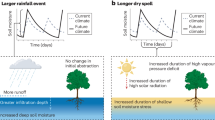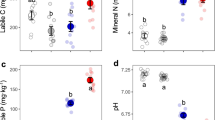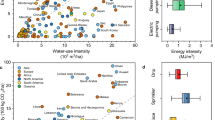Abstract
The UK Farm-Scale Evaluations (FSE) compared the effects on biodiversity of management of genetically modified herbicide-tolerant (GMHT) spring-sown crops with conventional crop management1. The FSE reported larger weed abundance under GMHT management for fodder maize2, one of three crops studied. Increased seed production may be important for the long-term persistence of these arable weeds and may benefit invertebrates, small mammals and seed-eating birds1. In three-quarters of FSE maize fields, growers used atrazine on the conventionally managed half, reflecting contemporary commercial practice3. Withdrawal of the triazine herbicides atrazine, simazine and cyanazine from approved lists of EU chemicals4 could therefore reduce or even reverse the reported benefits of GMHT maize1,2,5. Here we analyse effects of applications of triazine herbicides in conventional maize regimes on key indicators6, using FSE data. Weed abundances were decreased greatly relative to all other regimes whenever atrazine was applied before weeds emerged. Here, we forecast weed abundances in post-triazine herbicide regimes7,8. We predict weed abundances under future conventional herbicide management to be considerably larger than that for atrazine used before weeds emerged, but still smaller than for the four FSE sites analysed that used only non-triazine herbicides. Our overall conclusion is that the comparative benefits for arable biodiversity of GMHT maize cropping would be reduced, but not eliminated, by the withdrawal of triazines from conventional maize cropping.
This is a preview of subscription content, access via your institution
Access options
Subscribe to this journal
Receive 51 print issues and online access
$199.00 per year
only $3.90 per issue
Buy this article
- Purchase on Springer Link
- Instant access to full article PDF
Prices may be subject to local taxes which are calculated during checkout

Similar content being viewed by others
References
Firbank, L. G. et al. The Implications of Spring-Sown Genetically Modified Herbicide-Tolerant Crops for Farmland Biodiversity: A Commentary on ‘The Farm Scale Evaluations Of Spring Sown Crops’. (Defra, 2003); at 〈http://www.defra.gov.uk/environment/gm/fse/index.htm〉.
Heard, M. S. et al. Weeds in fields with contrasting conventional and genetically modified herbicide-tolerant crops. 1. Effects on abundance and diversity. Phil. Trans. R. Soc. Lond. B 358, 1819–1832 (2003)
Perry, J. N., Rothery, P., Clark, S. J., Heard, M. S. & Hawes, C. Design, analysis and power of the Farm-Scale Evaluations of Genetically-Modified Herbicide-Tolerant crops. J. Appl. Ecol. 40, 17–31 (2003)
Pesticide Safety Directorate. EC Review Programme for Existing Active Substances. (PSD, York, 2003); at 〈http://www.pesticides.gov.uk/ec_process/ECreviews/EC_review_programme.htm〉.
Heard, M. S. et al. Weeds in fields with contrasting conventional and genetically modified herbicide-tolerant crops. 2. The effects on individual species. Phil. Trans. R. Soc. Lond. B 358, 1833–1846 (2003)
Firbank, L. G. et al. Farm-scale evaluation of genetically modified crops. Nature 399, 727–728 (1999)
British Statutory Nature Conservation Agencies. Advice to ACRE on the Implications of the Farm Scale Evaluations for Biodiversity in the UK. Evidence submitted to the ACRE Committee's Farm-scale Evaluation Results Open Meetings, November 2003 (English Nature, Peterborough, 2003); at 〈https://www.livegroup.co.uk/acrefarmscaleevaluations/SSL/index2.php?page=submissions〉.
Marshall, J. Glufosinate-tolerant Maize: Implications of the USA Experience for Weed Control in Forage Maize in the UK. Appendix 2 of evidence submitted by Greenpeace to the ACRE Committee's Farm-scale Evaluation Results Open Meetings, November 2003 (Greenpeace UK, London, 2003); at 〈https://www.livegroup.co.uk/acrefarmscaleevaluations/SSL/index2.php?page=submissions〉.
Champion, G. T. et al. Crop management and agronomic context of the Farm Scale Evaluations of genetically modified herbicide-tolerant crops. Phil. Trans. R. Soc. Lond. B 358, 1801–1818 (2003)
Acknowledgements
We thank members of the Scientific Steering Committee of the FSE for their support. A. Tuse provided suggestions. The FSE were funded by Defra and the Scottish Executive
Author information
Authors and Affiliations
Corresponding author
Ethics declarations
Competing interests
G.T.C. and M.J.M. had contracts (one in 2002, one in 2003, each of less than £5,000 per year, and expect another in 2004) from the Crop protection (not Biotechnology) division of Bayer CropScience, working on the economics of herbicide regimes in sugar beet (not maize or genetically modified crops). The other authors have no competing financial interests.
Rights and permissions
About this article
Cite this article
Perry, J., Firbank, L., Champion, G. et al. Ban on triazine herbicides likely to reduce but not negate relative benefits of GMHT maize cropping. Nature 428, 313–316 (2004). https://doi.org/10.1038/nature02374
Received:
Accepted:
Published:
Issue Date:
DOI: https://doi.org/10.1038/nature02374
This article is cited by
-
Ongoing functional evolution of the bacterial atrazine chlorohydrolase AtzA
Biodegradation (2014)
-
Lessons learned from the farm scale evaluation of GMHT crops
Journal für Verbraucherschutz und Lebensmittelsicherheit (2011)
-
Cumulative impact of GM herbicide-tolerant cropping on arable plants assessed through species-based and functional taxonomies
Environmental Science and Pollution Research (2009)
-
Environmental impact of herbicide regimes used with genetically modified herbicide-resistant maize
Transgenic Research (2008)
-
Identifying indicator species for post-release monitoring of genetically modified, herbicide resistant crops
Euphytica (2008)
Comments
By submitting a comment you agree to abide by our Terms and Community Guidelines. If you find something abusive or that does not comply with our terms or guidelines please flag it as inappropriate.



